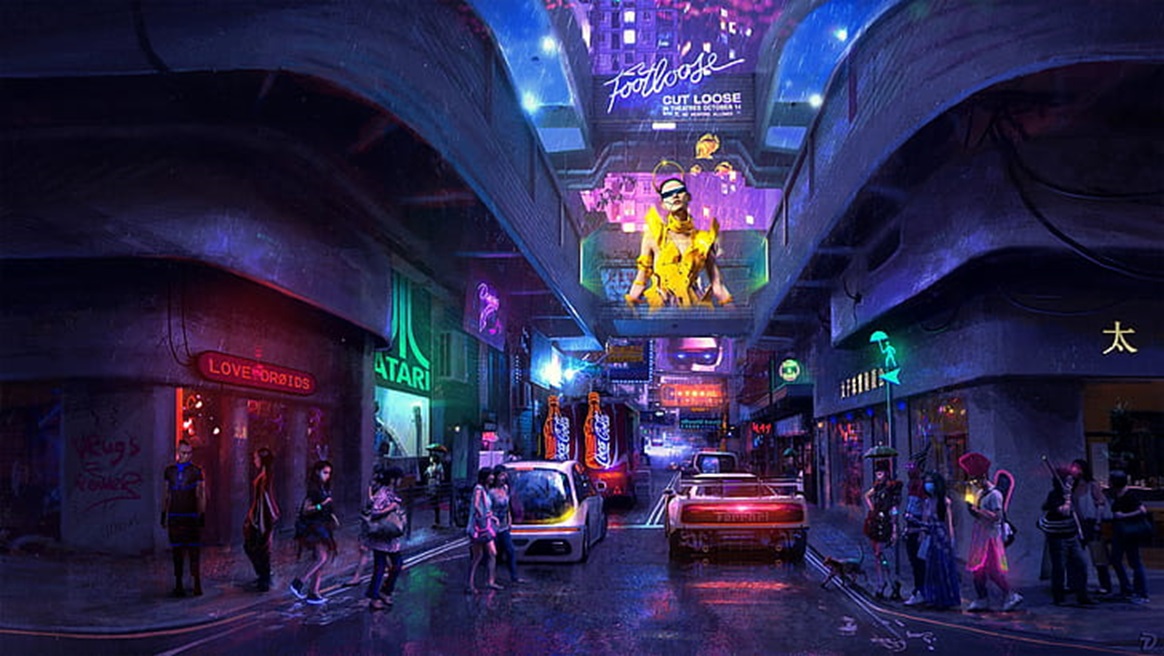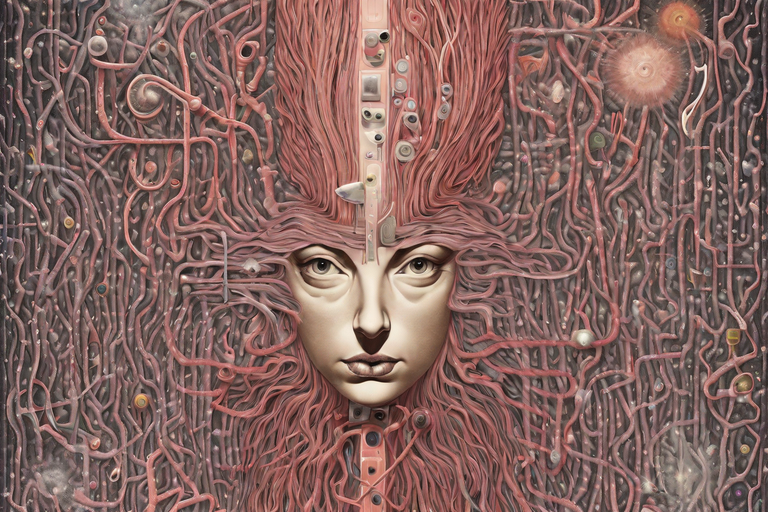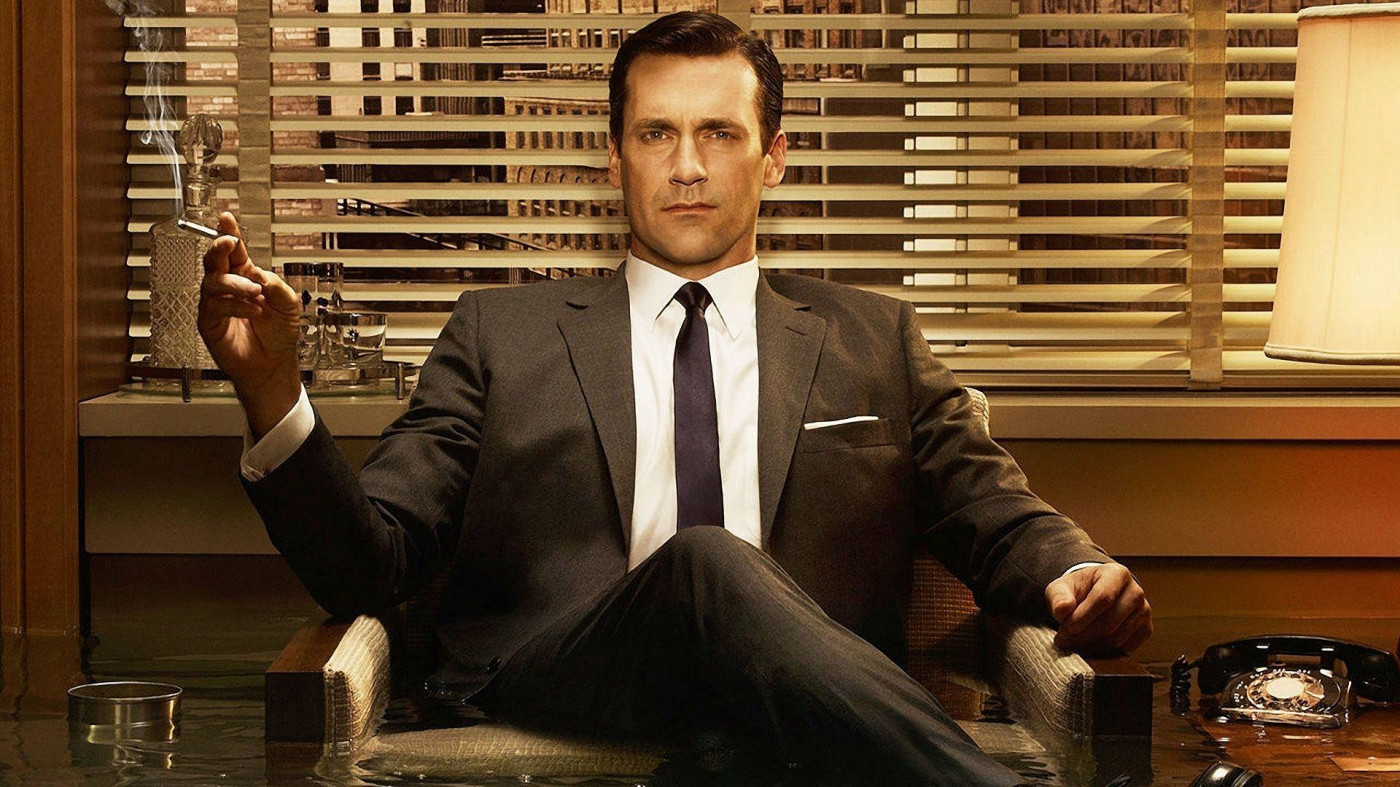When reality is replaced by the ‘antithetical’ or ‘upside-down’ version of itself then instead of happiness we have to make do with something else. Happiness is no longer on the cards, it’s no longer a possibility and so we have to find something else in place of it.
The reason happiness is no longer a possibility is because it can’t ever be separated from reality, and this means that if there is no more reality then there can be no more happiness. Happiness is somehow ‘contained’ in reality, in other words – it’s a part of it. Happiness (or well-being) isn’t an ‘add-on’, it’s not something that can be arrived at in the absence of reality.
The interesting question then becomes: ‘What kind of substitute for happiness or well-being can be generated in the absence of reality?’ It’s not too hard to understand what the answer to this question might be – what we looking at here is ‘life in the simulation’ and the point about a simulation is that it is what we might call a ‘fully-controlled situation’. Control is the fundamental principle here – nothing else actually counts for anything in the simulation, nothing else cuts the mustard.
In the simulation, things are always ‘what we say they are’; things are always ‘what we decide they should be’. The analogue for happiness or well-being in this realm is therefore linked with how good we are at ‘getting things to be what we say they should be’, how good we are at ‘getting outcomes to be what we decide they should be’. Life becomes a type of a ‘contest’ in other words, and the one who is best at getting things to be what they want them to be wins the contest! This is why the word ‘winner’ – with all the connotations that go with it – such an important word to us.
James Carse talks about this in terms of ‘finite games’ – the aim of finite play, he says, is to place ourselves in a position where nothing is ever going to take us by surprise. A ‘Master Player’, therefore, is someone would never gets forced to accept an outcome that they themselves have not decided upon. A ‘Master Player’ is a master controller, a master manipulator, a person who always calls all the shots – even when they seem not to be. ‘Well-being’ – for a finite game player – is therefore the ability to call all the shots, and thus not be taken by surprise by anything or anyone. Control and ‘the analogue of well-being’ (which we call ‘security’) go hand-in-hand therefore.
This is such a basic idea that we hardly need to have it explained to us! Who doesn’t understand this? The powerful have well-being and those lacking in power (the weak and the vulnerable) do not. Or as we could also say, ‘winners are happy (by definition!) whilst losers are sad’. How could anyone be a winner and yet not be happy, or be a loser and yet still be happy? We never look beyond being a winner (at whatever game you might be playing) – to be a winner is EVERYTHING and therefore the state of ‘being a winner’ must contain happiness. How could it not?
It stands to reason that, in the simulation, the ability to be better than anyone else at ‘getting things to be what we want them to be’, will be analogous with happiness or well-being. If I can get things to be the way I want them to be, then naturally I will arrange them to be to my advantage, rather than foolishly giving away this advantage to anyone else. And if you aren’t as good at getting things to be the way you want them to be as I am then I will decide matters for you, and you can be sure that this will not be to your advantage! This is what is called ‘dog eat dog’!
We all know the logic of the ‘dog eat dog’ world. We know it inside out – our whole society is based on it. We don’t understand anything else! Whether we admit it or not we idolise power and the reason we idolise power is because – quite understandably – we see it as being synonymous with our well-being. In the simulation realm (which as we have said is the ‘inverted analogue of reality’) it IS well-being! No matter how we try to make out that we aren’t playing games (or that we aren’t scheming to obtain some kind of advantage) we always are; we always are because – in a very fundamental level – it’s the only thing we understand. This is the only logic there is in ‘the domain of thought’ (which is the same thing as what we have been calling the ‘simulation realm’).
‘Power’ doesn’t just mean the ability to achieve the outcomes we want and refuse the ones we don’t want, it also means the ability to say what’s real and what isn’t real, what is truth and what isn’t truth. This is the whole point of the simulation realm, after all! Power is the ability to define reality, to put a spin on it so that it suits our idea of what we want it to be. When we consider the fact that all consensus realities are negotiated (obviously they are because we have to agree on them!) then this aspect of the use of power becomes particularly significant – those who lose in this contest are obliged to allow their entire reality to be defined by the victors, and what greater’ disadvantage’ could there be than this?
Power is the substitute for happiness or well-being therefore, but this doesn’t necessarily mean that it is going to be a good one. We asked for a substitute it is true, but no one said anything about it having to be a good one! It’s actually a very poor substitute – there couldn’t actually be a poorer one… The ability to say what reality is or is not turns out to be ‘a power that works against ourselves’, such that the more ‘successful’ we are on the short-term, the more suffering we are bound to inflict on ourselves in the long-term. ‘Nothing fails like success,’ as Alan Watt says.
The power to define reality (and not know that we are doing so) is just a fancy way of talking about ‘the power to hide from the truth’ and when we put it like this it is abundantly clear that no good can ever come from it! If our ‘superpower’ is the power to be effectively in denial of something that we don’t want to know, then this superpower is a power that is being used against ourselves. The better we are at it the worse news that is for us…
When we look into what happens when we find a way of ‘effectively denying something that we don’t want to know about’, we always find that the first result is an intense feeling of pleasure or relief or gratification. Because we want so badly not to know about the thing, when we get what we want in this regard we feel very intense relief. Our desire is gratified and because this desire is so intense the relief is tremendous. As far as the first stage of effective denial is concerned, ‘having control’ (or ‘having the power to define reality’) translates into pleasure (or euphoria) which is clearly a very good substitute for happiness or well-being. Pleasure feels very much like ‘well-being’, after all.
Control doesn’t just translate into pleasure or relief or satisfaction or gratification however, anymore than denial does – there’s more to it than just that! To start off with there is relief/pleasure/gratification for sure, but this is only ‘the first act’! The euphoria which we are so fond of is ‘the bait in the trap’, nothing more, and once we have succumbed to the lure of the bait then we find that all traces of pleasure vanish very quickly indeed. The mouse caught in the mousetrap doesn’t remember the pleasure of eating the cheese once the trap has been sprung, after all! That’s the last thing on its mind. Once we have fallen for the lure of the bait then we are immediately and unceremoniously propelled into the ‘second act’ of the show which is where we suffer – at our leisure – the atrocious pain of having all our freedom taken away, the interminable pain and suffering of abject mechanical servitude…







Mike Bucur
So if i manage to escape the virtual reality & enter the “real” Reality will i be happy then? This what you imply?
Sorry if don’t understand. It was a difficult but worthwhile read…
Nick Williams
Hi Mike, that is it in a nutshell, for sure. One thing is sure and that is that we can never be happy in the virtual reality! The point of this article is that thought provides us with an analogue of reality not the real thing, which is obvious enough (how could it provide us with the real thing?) Within the virtual reality that thought provides us with there are two possibilities – euphoria and dysphoria. Euphoria is false happiness and dysphoria is false sadness, we could say. If we control successfully (withing the game that we do not recognize as a game) then we get to feel good and if we don’t then we become losers and feel bad instead. Winning and losing aren’t real things, however, they just exist within the terms of the game we are playing (again, obviously enough). So if we ‘escape the VR’ (as you say) then there’s no more false happiness or false sadness. The analogue of happiness is a trick that’s being played on us because as long as we think that it’s real and keep chasing it we will never discover the genuine article. When we no longer take the game seriously then we are no longer chasing the illusion of false happiness and so straightaway we are back in reality which is the only place ‘real happiness’ can exist. ‘Real happiness’ is just another way of talking about reality itself, however – in Sanskrit it is called ananda’, or ‘bliss’.
This way of talking about things sounds rather cumbersome I know. It is really just a version of the essential Gnostic myth, which is says that we are trapped in a false reality. Plato’s ‘analogy of the cave’ says the same thing. Philip K Dick talks about the ‘Black Iron Prison’ versus the ‘Palm Tree Garden’ —
“There are two realities, he said to himself. The Black Iron Prison, which is called the Cave of Treasures, in which they now live, and the Palm Tree Garden with its enormous spaces, its light, where they originally dwelt. Now they are literally blind, he thought. Literally unable to see more than a short distance; far- away objects are invisible to them now. Once in a while one of them guesses that formerly they had faculties now gone; once in a while one of them discerns the truth, that they are not now what they were and not now where they were. But they forget again, exactly as I forgot. And I still forget somewhat, he realized. I still have only a partial vision. I am occluded, too.
But I will not be, soon.”
– Philip K Dick. The Divine Invasion. p.128
[The BIP is a vast complex life form (organism) which protects itself by inducing a negative hallucination of it. [from Philip K Dick’s Exegesis, quote taken from awakeninthedream.com]